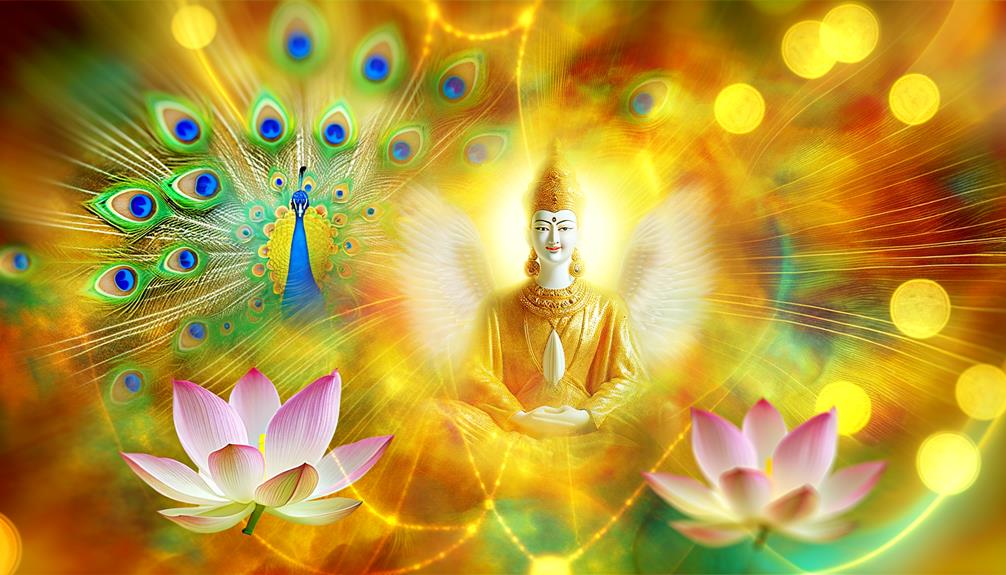Gayathri Name Meaning in English
The name 'Gayathri', derived from Sanskrit, combines 'Gaya' (song) and 'Tri' (to protect), translating to a protective chant or hymn. It holds dual significance, referring both to a sacred Vedic mantra and a revered goddess in Hindu tradition symbolizing wisdom and virtue.
The Gayathri Mantra, originating from the Rigveda, is central to daily spiritual rituals and symbolizes purity, knowledge, and divine feminine energy. This name conveys intellectual illumination and spiritual depth, making it appealing for contemporary usage while maintaining its profound cultural significance.
Explore further to uncover its rich historical roots and enduring relevance.

Key Takeaways
- Gayathri means a protective chant or hymn derived from the Sanskrit words 'Gaya' (song) and 'Tri' (to protect).
- It signifies a sacred Vedic hymn and a revered goddess in Hindu tradition.
- Represents spiritual invocation, divine protection, purity, knowledge, and wisdom.
- Originates from the Gayatri Mantra in the Rigveda, central to Hindu rituals and spiritual practices.
- Embodies the universal mother, symbolizing intellectual illumination and divine feminine energy.
Etymology of Gayathri
The etymology of the name Gayathri can be traced back to ancient Sanskrit, where it signifies a sacred Vedic hymn and a revered goddess in Hindu tradition. The term 'Gayathri' derives from the root words 'Gaya,' meaning 'song' or 'hymn,' and 'Tri,' meaning 'to protect' or 'to deliver.' Hence, Gayathri translates to a protective chant or hymn. The Gayathri mantra, dedicated to the divine light, embodies the essence of spiritual awakening and enlightenment. Understanding the gayatri name meaning explained reveals its profound significance, as it serves not only as a prayer for wisdom but also as a call for universal harmony. Devotees often recite this powerful hymn during meditation, seeking protection and guidance on their spiritual path.
In linguistic terms, it encapsulates the essence of spiritual invocation and divine protection. This profound connection to sacred texts underscores its importance in religious and cultural contexts.
The name embodies a dual significance: it denotes both the revered Gayathri Mantra, one of the oldest and most powerful Vedic chants, and the goddess Gayathri, personifying wisdom and virtue.
Historical Significance
Gayathri's historical significance is deeply rooted in its profound influence on Hindu rituals, literature, and spiritual practices.
Originating from the Gayatri Mantra in the Rigveda, it embodies a sacred prayer recited for millennia by adherents.
The mantra, dedicated to the deity Savitr, sought divine wisdom and enlightenment, establishing Gayathri as an epitome of spiritual aspiration.
Additionally, the name Gayathri has been immortalized in classical Sanskrit literature, often symbolizing purity, wisdom, and devotion.
Historically, it has been central to daily rituals such as the Sandhyavandanam, a tri-daily practice underscoring its importance in maintaining spiritual discipline.
This rich historical tapestry underscores Gayathri's enduring role in shaping the spiritual and cultural ethos of Hindu society.
Spiritual Connections
In Hindu spiritual practices, Gayathri serves as a conduit for invoking divine wisdom and enlightenment. The Gayathri Mantra, one of the most revered Vedic hymns, embodies this connection, seeking to illuminate the intellect and awaken spiritual insight. This mantra is dedicated to the Goddess Gayathri, symbolizing the universal mother and the source of all knowledge.
| Element | Significance |
|---|---|
| Gayathri Mantra | Invokes divine wisdom |
| Goddess Gayathri | Symbolizes the universal mother |
| Spiritual Insight | Awakens intellect and enlightenment |
Through regular recitation and meditation, practitioners aim to achieve a higher state of consciousness, thereby fostering a profound spiritual connection. The name Gayathri, resonates deeply within the domain of spiritual development and inner growth.
Gayathri in Literature
The name Gayathri holds significant literary relevance, appearing in ancient texts such as the Vedas where it is revered as a sacred chant. Modern literature also reflects the name's cultural resonance, with various authors incorporating Gayathri into their works to evoke spiritual and philosophical themes.
This dual presence across historical and contemporary narratives underscores the enduring impact of the name in literary traditions.
Ancient Textual References
Ancient Vedic scriptures frequently mention Gayathri, particularly highlighting its significance in various hymns and mantras.
The Gayathri Mantra, found in the Rigveda (Mandala 3.62.10), is one of the most revered and chanted hymns in Hindu tradition. This mantra, dedicated to the Sun deity Savitar, is considered a powerful invocation for enlightenment and wisdom.
In the Yajurveda and the Sama Veda, the Gayathri Mantra is reiterated, underscoring its integral role in Vedic rituals and daily practices.
Additionally, the Upanishads elaborate on the philosophical aspects of the Gayathri, presenting it as a representation of the universal consciousness.
These textual references collectively underscore the profound spiritual and cultural importance of Gayathri in ancient Indian literature.
Modern Literary Depictions
Contemporary literature continues to explore the multifaceted dimensions of Gayathri, weaving its spiritual and philosophical essence into modern narratives and poetic expressions.
Authors and poets frequently draw upon the profound symbolism of the Gayathri mantra, integrating themes of enlightenment, wisdom, and divine energy into their works. This name, often representing a convergence of intellect and spirituality, is employed to evoke deeper introspection and cultural resonance.
In novels, Gayathri often becomes a character symbolizing purity, strength, and transcendence. In poetry, it serves as a muse for meditative verses that seek to bridge the temporal with the eternal.
Through these literary depictions, Gayathri continues to inspire and illuminate contemporary discourse, enriching the tapestry of modern literature.
Cultural Importance
Deeply ingrained in Hindu tradition, the name Gayathri carries profound cultural significance, often associated with spiritual chants and revered deities.
The Gayathri Mantra, one of the oldest and most revered Vedic hymns, is dedicated to the goddess Gayathri, who embodies the essence of wisdom and enlightenment.
This mantra is frequently recited in daily prayers and significant religious ceremonies, emphasizing Gayathri's integral role in spiritual practice.
The name symbolizes purity, knowledge, and the divine feminine, reflecting its deep connection to Hindu cosmology.
Additionally, Gayathri is often depicted as a five-faced goddess, representing the five elements and the omnipresence of the divine.
Therefore, the name Gayathri resonates with cultural reverence and spiritual depth in Hinduism.
Modern Usage
In contemporary society, the name Gayathri continues to hold relevance, transcending its traditional roots to become a popular choice for girls in various cultural contexts. This name is often selected for its melodic sound and profound historical significance. Modern parents appreciate its multifaceted appeal, blending heritage with contemporary resonance.
Social trends indicate a rising preference for names that embody cultural richness while remaining globally accessible, and Gayathri fits this criterion effectively. Additionally, its adaptability in different languages and ease of pronunciation contribute to its widespread acceptance.
The name's sustained popularity underscores a broader trend towards valuing names that offer both aesthetic charm and a connection to cultural or spiritual traditions.
Symbolism and Interpretations
Rooted in ancient Sanskrit, the name Gayathri carries profound symbolic meanings, often associated with wisdom, knowledge, and the divine feminine.
The name derives from the Gayatri Mantra, a revered Vedic hymn that invokes the universal force of enlightenment and protection.
Symbolically, Gayathri represents the goddess of Vedic knowledge and is often depicted with five faces symbolizing the five pranas (vital life forces) and five elements.
This multifaceted symbolism underscores her role as a bridge between the material and spiritual domains.
Additionally, her association with the Sun signifies illumination and clarity of thought, making Gayathri a powerful emblem of intellectual and spiritual pursuit.
In essence, the name encapsulates a rich tapestry of cultural, spiritual, and philosophical elements.
Choosing the Name Gayathri
Choosing the name Gayathri involves considering its profound cultural significance, deeply rooted in Hindu traditions and mythology.
The name also carries spiritual connotations, often associated with the revered Gayathri Mantra, which can imbue a sense of sacredness and purpose.
Additionally, it retains a modern appeal, seamlessly blending traditional values with contemporary preferences.
Cultural Significance
The name Gayathri holds profound cultural significance, deeply ingrained in Hindu traditions and spiritual practices. It is revered for its connection to the ancient Gayathri Mantra, a sacred hymn that epitomizes wisdom and enlightenment. Choosing this name reflects a deep respect for heritage and a desire to impart lasting values.
- Historical Roots: The name traces back to Vedic scriptures, emphasizing its ancient origins.
- Literary References: Mentioned in various Hindu epics, reinforcing its cultural importance.
- Gender Neutrality: While mainly female, the name is sometimes used for males, indicating versatility.
- Symbolic Representation: Often associated with the goddess of knowledge, Saraswati.
- Modern Usage: Continues to be a popular choice, blending tradition with contemporary appeal.
This multifaceted significance makes Gayathri a name of lasting cultural resonance.
Spiritual Connotations
Infused with profound spiritual significance, the name Gayathri is intrinsically linked to the pursuit of higher wisdom and enlightenment in Hindu philosophy. Central to this association is the Gayathri Mantra, one of the most revered Vedic hymns, invoking the divine for intellectual illumination and spiritual awakening.
This mantra is dedicated to Gayathri Devi, a manifestation of the universal mother, embodying knowledge and purity. Choosing the name Gayathri for a child signifies a deep reverence for spiritual growth and an alignment with divine principles. It reflects a commitment to values of wisdom, clarity, and inner peace, encapsulating the essence of a life dedicated to spiritual and intellectual development in the Hindu tradition.
Modern Appeal
In contemporary society, the name Gayathri retains its resonance, appealing to modern parents who appreciate its rich spiritual heritage while also valuing its timeless elegance and cultural significance. This name embodies a unique blend of tradition and modernity, making it a favored choice for those seeking a meaningful and enduring name for their child.
Key reasons for its modern appeal include:
- Cultural Connection: Preserves a deep cultural and religious significance.
- Timelessness: Offers an ageless quality that transcends trends.
- Spiritual Depth: Reflects profound spiritual connotations.
- Phonetic Beauty: Possesses a melodious and pleasing sound.
- Versatility: Suitable for various contexts, from casual to formal settings.
Gayathri's continued popularity underscores its robust appeal across generations.
Conclusion
In the grand tapestry of linguistic and cultural heritage, the name Gayathri emerges as a luminous thread, rich with historical significance and spiritual resonance. Its roots, tracing back to ancient texts, imbue it with a timeless aura.
The name's presence in literature and its enduring cultural importance underscore its relevance. In contemporary times, Gayathri stands as a beacon, symbolizing a confluence of tradition and modernity, making it a name of profound depth and enduring appeal.






